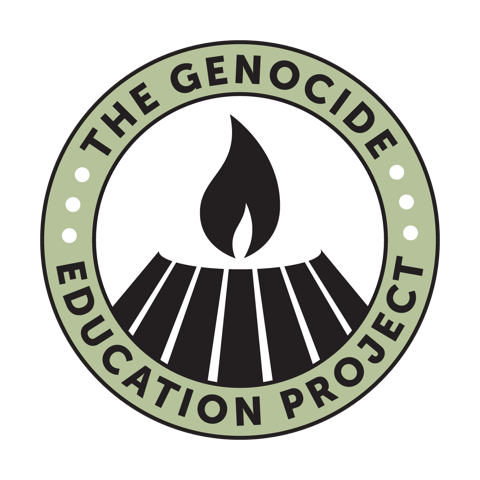Watertown, MA, June 10 – The Genocide Education Project provided a comprehensive, full-day teacher-training workshop for Boston-area History and English teachers.
Co-hosted by Armenian Library and Museum of America, the National Association for Armenian Studies and Research, Watertown and Boston Public Schools, and Project Save, and with the participation of the USC Shoah Foundation, the wide-ranging workshop included a tour of ALMA and a special meeting with 106-year old Armenian Genocide survivor, Asdghig Alemian.
“I have been teaching for over 25 years and I have been to a lot of conferences, and this was by far one of the best. The survivor presentation was incredible as were the other speakers and many resources,” said Joanna Honig, Watertown High School English and Humanities teacher .
After welcoming remarks from The Genocide Education Project Board Member, Roxanne Makasdjian, Sara Cohan, USC Shoah Foundation Armenian Education & Outreach Specialist and GenEd Education Advisor kicked off the  presentations with a discussion of the importance of genocide curriculum, including the Armenian case. She later introduced teachers to survivor testimonies and teaching tools on the USC Shoah Foundation website, filmed by prolific Armenian-American documentary filmmaker, J Michael Hagopian.
presentations with a discussion of the importance of genocide curriculum, including the Armenian case. She later introduced teachers to survivor testimonies and teaching tools on the USC Shoah Foundation website, filmed by prolific Armenian-American documentary filmmaker, J Michael Hagopian.
Dr. Dikran Kaligian, historian and GenEd Board member provided the historical and political context, timeline, and methodology of the Armenian Genocide, as well as the U.S. response, the extraordinary efforts of the Near East Relief organization. He also addressed the government of Turkey’s denial of this history and its ramifications on international affairs, US foreign and domestic policy and education.
 Makasdjian conducted a live interview with Armenian Genocide survivor, Asdghig Alemian, who recounted glimpses of her life prior to the genocide and her life in Turkish homes before being rescued. “It was a great privilege for me to be able to learn about Asdghig’s extraordinary life, introduce her to our workshop attendees, and interview her to allow us all the benefit of her life experience and inner strength.”
Makasdjian conducted a live interview with Armenian Genocide survivor, Asdghig Alemian, who recounted glimpses of her life prior to the genocide and her life in Turkish homes before being rescued. “It was a great privilege for me to be able to learn about Asdghig’s extraordinary life, introduce her to our workshop attendees, and interview her to allow us all the benefit of her life experience and inner strength.”
After her father was killed by Turkish authorities, Alemian, her mother, sister, and two brothers were forced onto a death march into Syria. After her two brothers died on the trek, her mother gave five-year old Asdghig and her older sister to a Turkish policeman, who placed them in a Turkish home, where they were severely mistreated. The sisters were later separated, with Asdghig being sent to another Turkish home in Aleppo. During the workshop’s live interview, Asdghig re-iterated multiple times her anguish in having been separated from her sister, despite her being re-united with her later. The two were rescued and spent several years at Aleppo’s Evangelical Armenian orphanage, before being located by their uncle in Massachusetts and brought to the U.S.
Ruth Thomasian, Executive Director of Project SAVE – the Armenian Photograph Archive, discussed how she collects and uses family photographs as a teaching tool and window into the life of Armenians in the past. 
Novels and memoirs about the Armenian Genocide can be valuable resources for English Language Arts and Humanities courses, as presented by Marc Mamigonian, Director of Academic Affairs at the National Association for Armenian Studies and Research. Focusing on middle and high school-appropriate books Forgotten Fire, Black Dog of Fate, Goodbye Antoura, and My Name is Aram, Mamigonian discussed their value as good literature and as historical instruction.
GenEd’s Rhode Island branch co-director, Pauline Getzoyan introduced GenEd’s 12-minute video documentary, “The Armenian Journey,” based on her grandmother’s story of Armenian Genocide survival and directed them to GenEd’s teaching guidebook accompanying the video, as well as instructions for the assignment she gives her writing course students on writing a persuasive essay on the topic of the Armenian Genocide.
Houry Boyamian, St. Stephens Armenian Elementary School principal and daughter of educator and Armenian Genocide survivor, Karnig Panian, presented “Goodbye Antoura,” her father’s recently translated memoir of his genocide experience, institutionalization and abuse in a Turkish orphanage, and his escape to freedom. Boyamian offer to serve as a resource as a classroom speaker and consultant for Boston-area schools.
Educators were led through GenEd’s website offerings, where they can download a variety of materials for teaching about genocide. They were each given a classroom poster commemorating the 100th anniversary of the Armenian Genocide.
Armenian Library and Museum of America’s curator, Gary Lind-Sinanian, gave teachers a tour of through the exhibit spaces, and they enjoyed a traditional Armenian lunch catered by local Watertown Armenian-American food vendors.
